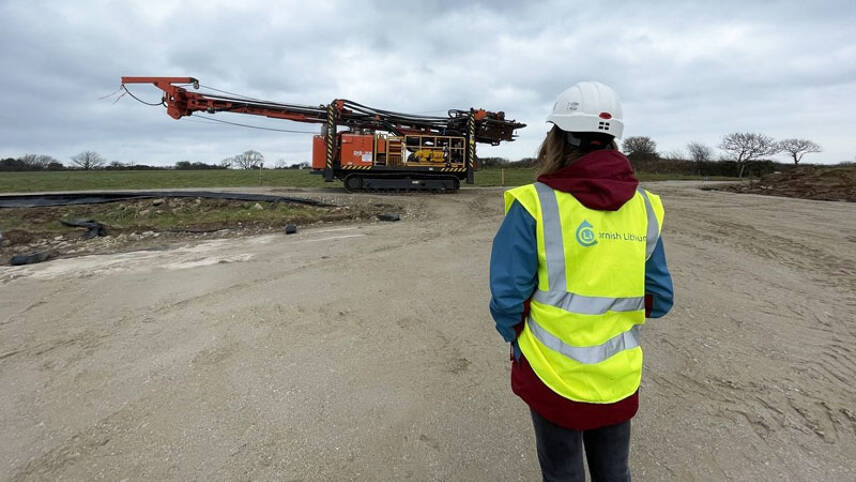Register for free and continue reading
Join our growing army of changemakers and get unlimited access to our premium content

Image: Cornish Lithium
Funding has been provided by the UK Infrastructure Bank, as well as Cornish Lithium’s largest existing shareholder TechMet and the Energy & Minerals Group. In total, the funding round confirmed today (8 August) is almost £24m.
Cornish Lithium’s total initial investment recently surpassed the £53m mark. The new funding today is part of an additional second stage of financing, which could raise up to £168m. Cornish Lithium will use this additional funding to achieve commercial production of lithium and other metals and minerals.
Like many other wealthy nations, the UK is looking to grow its domestic supply of the metals and minerals that will be key to the energy transition, including lithium. Demand for lithium is set to soar as the electric vehicle (EV) market expands – but, at present, extraction is highly concentrated in a few markets including Chile and China.
Moreover, existing extraction methods often have negative impacts on ecosystems and human health. Extraction from geothermal waters using new technologies could reduce lithium’s lifecycle impact on the environment.
UK Infrastructure Bank boss John Flint said: “Globally the supply of lithium is far outpaced by demand, and yet in the UK it remains a nascent market.
“Our investment has already crowded-in private sector financing which will greatly accelerate domestic production of a mineral which is critical to the future of EV battery production and decarbonisation of the transport sector. This model of investment is fundamental to the success of the UK’s transition to net-zero.”
The UK Infrastructure Bank was created after Brexit to replace the role of the European Investment Bank in Britain. It has listed clean energy value chain investment as a major priority as part of its remit to focus on the low-carbon transition.
Levelling up and next steps
The UK Infrastructure Bank emphasised how Cornish Lithium could contribute to the UK Government’s levelling up agenda as well as its vision to scale low-carbon industries. Cornish Lithium is aiming to employ more than 300 people in Cornwall and is expecting to generate £800m of economic benefit for local communities over a 20-year period through its first project alone, the Trelavour Hard Rock Mine.
Cornish Lithium’s founder and chief executive Jeremy Wrathall said the new funding was “essential” for the firm’s expansion. It will enable this mine to progress to a construction-ready status. It will also fund the engineering design work for an additional demonstration-scale lithium extraction pilot facility.
Wrathall said: “A significant amount of work over many months has gone into securing this funding and I would like to thank our team at Cornish Lithium for all of their efforts to bring this transaction to fruition in collaboration with the teams at the UK Infrastructure Bank, EMG and TechMet. It is exciting to now be able to share the news and look ahead to the next stage of our work.”
In addition to securing the investment through the UK Infrastructure Bank, Cornish Lithium has confirmed a further retail share offering of up to £6.9m, through Crowdcube. A launch date has not yet been announced.
Cornish Lithium and competitor British Lithium recently celebrated the news that Jaguar Land Rover will build an EV battery Gigafactory in the UK. The firm’s parent company Tata Group had been looking at other locations with potentially lower energy and material costs, but was swayed by an undisclosed package from the UK Government.
Energy Security and Net Zero Secretary Grant Shapps said: “Today’s investment in Cornish Lithium is a strong vote of confidence in the South West’s future at the cutting edge of EV technologies. Coming hot on the heels of Tata’s £4bn investment in its gigafactory in Somerset last month – one of the largest investments ever in our automotive sector – this planned expansion will be a key part of ensuring a domestic supply of lithium that is so vital to developing batteries and battery storage here in the UK.”
The UK Government has already been urged several times to set more robust plans for growing the nation’s Gigafactory stock this decade, to avoid relying on imports and therefore missing out on opportunities for green job creation and international battery trade.
A second EV Gigafactory in England is in the works for England. A third was in the pipeline for the North East but BritishVolt’s collapse means its site will likely be used for larger batteries than those for cars.


Please login or Register to leave a comment.